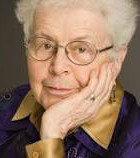Madeline DeFrees
Madeline DeFrees Poems
That Sunday at the zoo I understood the child I
never had would look like this: stiff-fingered
spastic hands, a steady drool, and eyes in cages
with a danger sign. I felt like stone myself
...
Madeline DeFrees Biography
Poet Madeline DeFrees was born in 1919 in Ontario, Oregon and grew up in Hillsboro, a community of Dutch farmers. After graduating from high school at age 17, she entered the order of Sisters of the Holy Names of Jesus and Mary and took the name Sister Mary Gilbert. She remained in the convent for nearly 40 years, earning degrees from Maryhurst College and the University of Oregon. Not long after graduating, she published her first book, The Springs of Silence (1953), a memoir about her experiences in her convent, later followed by Later Thoughts from the Springs of Silence (1962), which focuses on a time when Holy Names College was moving to a new location. Although these are prose works, DeFrees was also privately writing verses, which she rarely showed to anyone and did not publish in book form until From the Darkroom (1964). In 1967 DeFrees moved to Missoula, Montana to teach, a move that precipitated her turn from the Catholic Church. In 1973 she was dispensed from her vows and turned to writing and teaching. She taught at the University of Massachusetts from 1979 to 1985, moving back to Seattle after her retirement. She published numerous collections of poetry, including When the Sky Lets Go (1978), Magpie on the Gallows (1982), Possibly Sibyls: New Poems (1991), Double Dutch (1999), Blue Dusk: New and Selected Poems (2001), which won both the Lenore Marshall Poetry Prize and a Washington Book Award, and Spectral Waves (2006). DeFrees once described her approach to Contemporary Authors: “Writing is for me both an instrument of discovery and a way of organizing and understanding experience.” Her poems frequently reflect the tension between the religious and secular worlds. Because of their religious tenor, and complex language—including double meaning, puns, allusions, and line breaks—DeFrees’s work has often been compared to that of John Donne. In Poetry, critic Robert Holland noted that DeFrees’s “poems are like Donne’s ... mostly in their refusal to allow the speaker (or the reader) any rest, any false resolution of the unrelenting struggle she is locked in.” Though intimately connected to her own experience and struggles with religious and secular identity, DeFrees’s poems are not merely personal, or even particularly accessible; they often use high or arch diction to blur any easy identification of poet with speaker. In her interview with Contemporary Authors, DeFrees alleged, “My favorite book is the dictionary in all its forms, including the Oxford English Dictionary. I refer to it often whenever I am writing. I have even been known to buy a fourth collegiate dictionary when on vacation at the beach because I couldn’t exist without one. I like to revive former senses of words, to use their derivations, and, above all, to be as precise as possible while, at the same time, drawing on the richness of language, its connotative values.” DeFrees won numerous honors and awards for her work, including fellowships from the National Endowment for the Arts and the Guggenheim Foundation. She died in 2015.)
The Best Poem Of Madeline DeFrees
The Family Group
That Sunday at the zoo I understood the child I
never had would look like this: stiff-fingered
spastic hands, a steady drool, and eyes in cages
with a danger sign. I felt like stone myself
the ancient line curved inward in a sunblind
stare. My eyes were flat. Flat eyes for tanned
young couples with their picture-story kids. Heads
turned our way but you'd learned not to care. You
stood tall as Greek columns, weather-streaked
face bent toward the boy. I wanted to take his hand,
hallucinate a husband. He whimpered at my touch.
You watched me move away and grabbed my other
hand as much in love as pity for our land-locked
town. I heard the visionary rumor of the sea. What
holds the three of us together in my mind is something
no one planned. The chiseled look of mutes.
A window shut to keep out pain. Wooden blank of doors.
That stance the mallet might surprise
if it could strike the words we hoard for fears
galloping at night over moors through convoluted bone.
The strange uncertain rumor of the sea.
